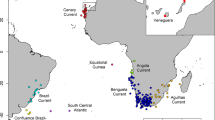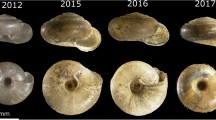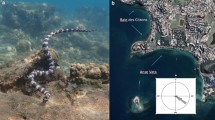Abstract
RECENT suggestions have been made relating the distribution of Chthamalus stellatus1,2 to low-temperature isotherms. It may therefore be of value to put on record some new observations on its breeding made over the past three years, which have a bearing on present distribution.
This is a preview of subscription content, access via your institution
Access options
Subscribe to this journal
Receive 51 print issues and online access
$199.00 per year
only $3.90 per issue
Buy this article
- Purchase on Springer Link
- Instant access to full article PDF
Prices may be subject to local taxes which are calculated during checkout
Similar content being viewed by others
References
Moore and Kitching, J. Mar. Biol. Soc., 23, 521 (1939).
Nature, 165, 408 (1950).
Chipperfield, thesis (1948) and personal communications.
Powell, personal communications.
Bassendale, Proc. Zool. Soc. 57 (1936).
“Plymouth Marine Fauna”, 178 (1931).
Hatton and Fischer Piette, Bull. Inst. Oceanogr. Monaco, 592, 1 (1932).
Author information
Authors and Affiliations
Rights and permissions
About this article
Cite this article
CRISP, D. Breeding and Distribution of Chthamalus stellatus. Nature 166, 311–312 (1950). https://doi.org/10.1038/166311b0
Issue Date:
DOI: https://doi.org/10.1038/166311b0
This article is cited by
-
Distribution ranges of the acorn barnacle Perforatus (=Balanus) perforatus (Bruguière, 1789) in the NE Atlantic are influenced by reproductive parameters
Hydrobiologia (2018)
-
Reproduction in Balanus amphitrite Darwin (Cirripedia: Thoracica): influence of temperature and food concentration
Marine Biology (2006)
-
Seepocken der deutschen Küstengewässer
Helgoländer Meeresuntersuchungen (1987)
-
Variability of shell growth and morphology of the wall-plate junctions of the intertidal barnacle Tesseropora rosea (Cirripedia: Tetraclitidae)
Marine Biology (1985)
-
Allelic esterase isozymes, their variation with season, position on the shore and stage of development in the cirripede Balanus balanoides
Marine Biology (1976)
Comments
By submitting a comment you agree to abide by our Terms and Community Guidelines. If you find something abusive or that does not comply with our terms or guidelines please flag it as inappropriate.



